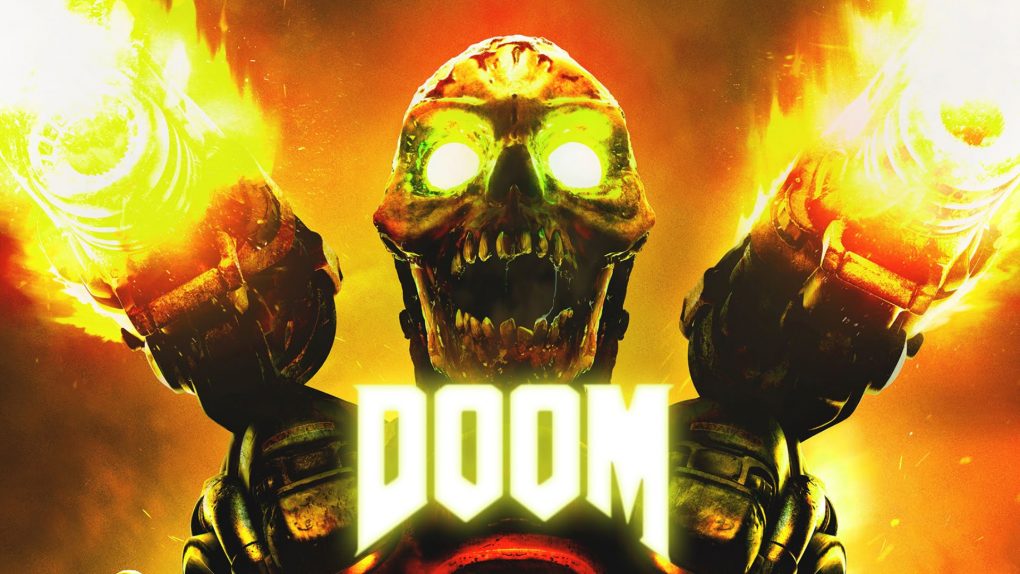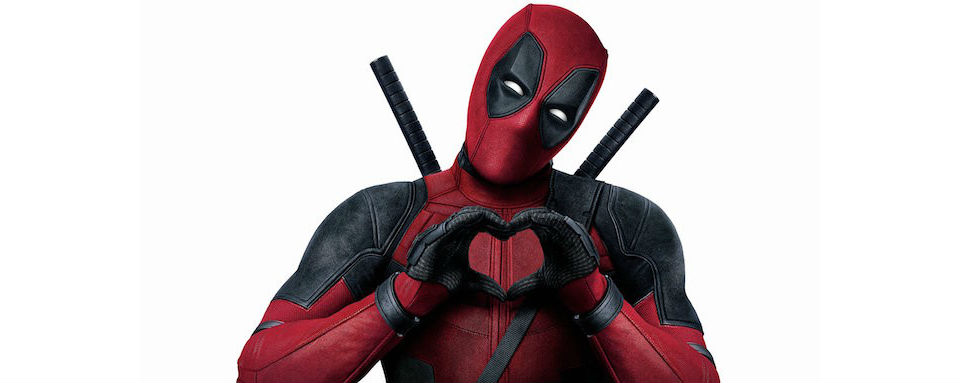There’s a bit of an ongoing joke among the movie going public that eventually Marvel is going to make a movie that is actively bad. In terms of quality, they’ve managed a seriously impressive string of critical and financial successes that really hasn’t been seen since Miramax back in the 90s. But eventually, the thinking would go, Marvel would flame out by going too far. Guardians of the Galaxy, with its talking Squirrel and Space Ent was supposed to be the bad one right until it came out and set those poor expectations ablaze through how improbably good it turned out to be. Then the proverbial camel was supposed to have its proverbial camel humped back broken by the overstuffed Captain America : Civil War, but that managed to defy expectations and tell a heartfelt and fundamentally interesting story. Oh, and it made enough money to buy a small country, Latveria perhaps. But like I said up top, there still a feeling that Marvel is going to whiff eventually and deliver us a bomb, and based on the source material, Doctor Strange was supposed to be that failure. Thankfully and in spite of whatever expectations might have existed, Doctor Strange is not that movie, but if Marvel keeps recycling the structure that it follows so slavishly then it’s just a matter of time before that effect stops being magical.
In the Beginning…
At it’s core Doctor Strange is an origin story, and that is fundamentally one of the things that it has working against it. Tell me if you’ve heard this one before – an arrogant man loses something that is important to him, he seeks out a way to better himself, discovers some unknown power or ability and manages to save the day against something that just 90 short minutes previously he didn’t even know existed. That’s the rough outline of Iron Man. Fun right? Squint your eyes a little bit and it’s also the first Thor. The point is that origin stories are easy, and at this point rote.
But this does put Marvel Studios in an odd position – needing to constantly introduce new characters to replace the ones that will either age out of roles or come to the end of exceptionally expensive multi-picture deals. So the good old fashioned origin story may just be something that we have to deal with. Yet I am really hesitant to just let Marvel get away with this form of storytelling. Civil War managed to introduce characters within the context of a different story and audiences didn’t bat an eye. If anything getting bonus characters like Black Panther and Spider Man (spoiler) was seen as a fun bonus. Or on the TV side of the equation Jessica Jones and Luke Cage forgo origin stories entirely. It’s downright refreshing.

Of course origin stories do serve a purpose, and often an important one. An origin story doesn’t just establish the character within the world, but it introduces the world that the character exists within. For Doctor Strange, this is a world wildly unlike anything else in the MCU. This means that that the film has to devote a lot of time to creating its world full of multiple dimensions and magic. Unlike Thor which sidestepped magic in favor of “Really really advanced technology” Doctor Strange just straight up goes for it, dipping into eastern mysticism and arguing a thesis that seems to happily state that science can’t answer everything. Because Doctor Strange goes in that direction and plays with the concept of magic in a perfectly straight way it makes the ins and outs of the origin something that is exciting again. It never bothers to stay put for too long before throwing another new concept or power or idea or conflict (both physical and meta-physical) at the audience. Much like the cinematography (which clearly borrows from the mind bending illustrations of Steve Ditko) the machinations of the plot and world building on display are bewildering. Soon it begins to seem like Doctor Strange is an origin story because it needs to be. As if the core plot needed to be as familiar as possible for the audience so that everything else had a chance. Otherwise the risk of overwhelming the audience would be a very real possibility.
For my part I felt like I was seeing something different from Marvel. Doctor Strange isn’t really a superhero film, even as it wears the trappings. It instead delights in asking questions about the nature of heroism and the natural order, and then sidesteps giving any kind of easy answer. The audience got this first taste of fuzzy superheroic morality in the previously mentioned Captain America, and with Doctor Strange they go even deeper into the gray areas that are fundamentally at the core of the genre. So (spoiler, duh) late in the film the good Doctor and his friend Mordo discover that the Ancient One – their mentor and Sorcerer Supreme has managed to live as long as she has because she is drawing power from the Dark Realm and the extra-planar demon Dormammu.
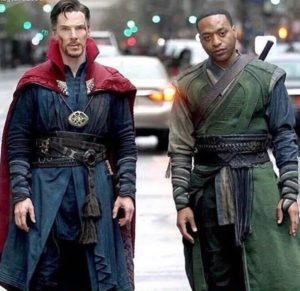
This of course leads Mordo and Strange to a core disagreement – is it okay to use dark powers if you are working towards the greater good? Mordo (who in the comic is one of Strange’s greatest enemies) actually argues that, no it isn’t okay, and the source of the power will invariably corrupt the deeds. Worse, he implies that by playing with powers he doesn’t fully understand Strange may be doing irrevocable damage in the process. He’s not wrong. While Strange is on the side that the source of the power is irrelevant – it’s all about how it is used. Or phrased another way – the ends justify the means and he alone can control it. Which, if you think about it is just a few inches removed from making him the villain in his own story. It happens and it’s one of the things that makes Doctor Strange work.
These sorts of philosophical questions piled on top of the plot may actually turn some people off. But instead I feel that there is no other place in the MCU to ask them. Scott Lang isn’t going to ponder this stuff after all, and it makes it so that moving forward Doctor Strange films will be able to offer audiences something unique. At the same time, if Marvel continues to keep putting out origin stories the audience is going to get fatigued from the entire enterprise. Doctor Strange works because it is exploring a new and uncharted part of the universe, but if they try again with a dude that just ends up in colored tights it’s going to stop working, and then we’ll finally get that bomb.
…There Was a Magic Trick
So let’s talk about how this movie looks for a moment. I’ve made hay before about films looking like hot garbage, but Doctor Strange is about as far from that as you can get. This film looks goddamn sexy in parts. Early trailers showed off some of the cinematography and special effects work and some people on the internet scoffed and said nonsense like, “Looks like Inception.” On the one hand, the city bending effects in one scene taking place in the “Mirror Dimension” are a little Inception-esque, but honestly what’s on display in Doctor Strange is so far past anything even attempted by Nolan and company that it makes that comparison insulting. Strange really is that fantastic. The standout is the final battle where the destruction of a city plays out in reverse while the protagonists fight in the middle of it all. As far as climactic scenes go, it was a mic drop.
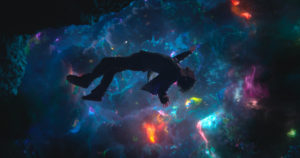
It’s a shame that the ending doesn’t really make any sense. For the most part, Doctor Strange does a pretty good job of explaining roughly how things work in its universe and what their powers and limitations are. But it never is explicit enough for things to cleanly be resolved. That’s because I think that as a movie it was working with the wrong kind of magic.
It’s a weird concept, so I’ll explain. “Magic” in movies or books or whatever is some power or ability (or technology) that has clearly defined rules so you can resolve the plot using them. An example of Magic is the Harry Potter Series. J.K. Rowling does a fine job in Book 7 of explaining all the ins and outs of wand lore. It’s a bit dry yes, but since she solves the plot about the Elder Wand using those rules it works. If she didn’t do that instead some stuff would have happened and the reader would be confused. This isn’t just tied to magical things either. The rules of The Matrix are magic in this sense since they work a certain way, and the rules are used by the heroes to win the day.
The alternative is “Majik,” and yes that’s the spelling that I use. Majik is a power or ability of whatever that doesn’t have clearly defined rules. It’s easy to think that this is bad, but honestly it’s just used differently. If there is a system that is intended to be vague, and sometimes menacing, then you do not want to give the reader all of the details. The spells in Lovecraft’s work are all Majik, since the outcomes and costs are not known. Hell, the Force in Star Wars is Majik – it’s a vague mystical thing that can grant extraordinary powers. But what is key is that if there’s Majik, you cannot use it to resolve the plot. Majik explicitly doesn’t have easy to follow rules, so if it’s used to win the day it feels like cheap hand waving.
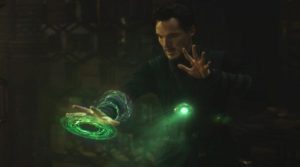
Doctor Strange tries to have it both ways and it doesn’t always work. The biggest issue has to do with an artifact called the Eye of Agamotto, which has the ability to bend time. Early in the film we see Strange use the Eye to move time forward and backwards, and that is as far as the film goes to explain what it does. However, in the third act, Strange uses the Eye to set into motion a full on rewind of time that he doesn’t control anymore (that the aforementioned city destruction scene). It’s certainly cool, but isn’t a power that we’ve seen it, or Strange, capable of doing.
The worst offender is the way that the film resolves the conflict between Dr. Strange and the demon Dormammu. In an attempt to stop the destruction of, like, the universe Strange flies into the Dark Dimension and confronts Dormammu directly. Before he does he sets the Eye to rewind the same moment over and over again and trap Dormammu in the time bubble with him. In the film that means we get to see Strange get horribly killed over and over again and have the scene reset. It’s fun. But it’s a power that is never explained, so instead of feeling like an earned victory it instead feels like a cop out, a shrug and an explanation that “A wizard did it.”
Which is unfortunate, since the rest of Dr. Strange managed to do something amazing. It made me believe once again that Marvel’s Magic is both alive and well. Thankfully, it’s also a little strange.
NitWitty Score : 5 Infinity Stones and 1 Surprisingly Not Bad American Accent







